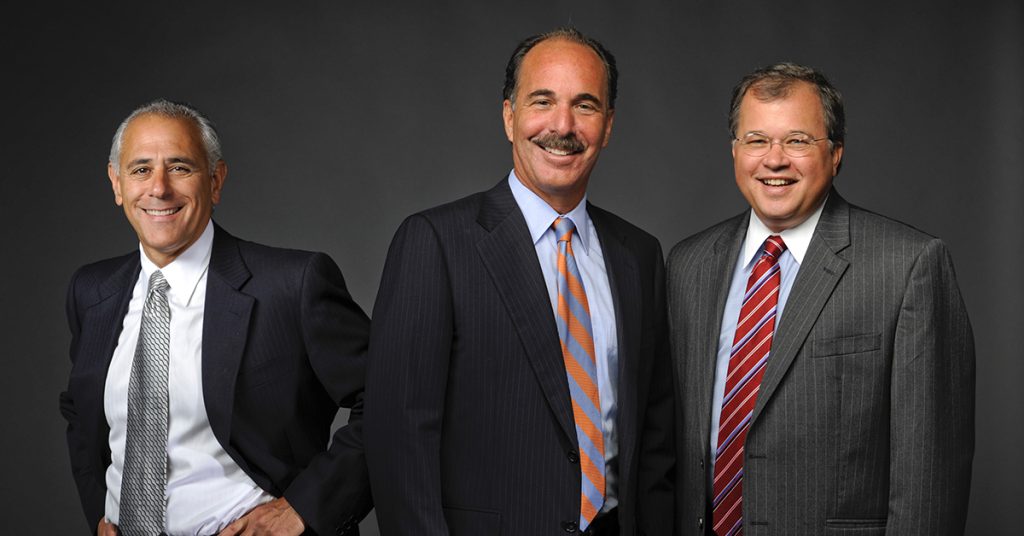Posts Tagged ‘“medical malpractice”’
Breakstone, White & Gluck Recognized by Best Lawyers in America© 2019

Left to right: Attorney Ronald E. Gluck, Attorney Marc L. Breakstone and Attorney David W. White have been recognized by Best Lawyers in America© 2019.
Breakstone, White & Gluck announces that our partners have been recognized in The Best Lawyers in America© 2019. Best Lawyers© is the oldest and most respected attorney ranking service in the world, providing a resource for those searching for legal services for more than 30 years. It ranks lawyers in partnership with U.S. News & World Report and other media partners.
Best Lawyers© compiles its annual list of attorneys based on a peer-review process. Nominations can be submitted online by members of the public, clients and other attorneys. But attorneys alone provide evaluations. Nearly 87,000 lawyers around the world are eligible to participate. For the ninth year, lawyers in the Boston region chose to rank Breakstone, White & Gluck. Our rankings:
Attorney Marc L. Breakstone was selected for inclusion in the fields of Medical Malpractice Law – Plaintiffs, Personal Injury Litigation – Plaintiffs and Professional Malpractice Law – Plaintiffs.
Attorney David W. White was selected for inclusion in the fields of Insurance Law, Personal Injury Litigation – Plaintiffs and Medical Malpractice Law – Plaintiffs.
Attorney Ronald E. Gluck was selected for inclusion in the field of Personal Injury Litigation – Plaintiffs.
About Breakstone, White & Gluck
Founded in 1992, Breakstone, White & Gluck has been widely recognized for our work representing clients in personal injury, medical malpractice and wrongful death cases. We bring more than 100 years combined experience to clients who have been injured by the negligence or wrongdoing of others. At the same time, we are committed to reducing injuries through our Project KidSafe campaign and by advocating for the rights of accident victims. Our attorneys have held leadership roles at statewide legal associations, including the Massachusetts Bar Association and the Massachusetts Academy of Trial Attorneys.
In addition to Best Lawyers©, our attorneys have been recognized on the Massachusetts Super Lawyers list, along with the Top 100 Massachusetts Super Lawyers and Top 100 New England Super Lawyers. Our partners have each received an AV rating from Martindale-Hubbell. This is the highest professional and ethical rating available for lawyers.
Personal Injury
Breakstone, White & Gluck represents those injured in all types of personal injury cases, with a commitment to provide our clients with aggressive representation and experienced, expert investigation. Our attorneys represent those injured in car accidents, commercial truck crashes, bicycle accidents and pedestrian accidents. Following bus and subway crashes, we have brought claims against the MBTA, winning at trial and appeal to the state’s highest court. We have specialized experience handling product liability, premises liability and construction accident cases. We work for the best financial result for our clients. When other attorneys may settle for unfair offers, we are committed to pursuing a just result at trial and appeal if necessary.
Medical Malpractice
Our lawyers are known across New England for our work standing up for clients who have been injured or killed by medical malpractice. Our attorneys offer extensive medical malpractice experience over 30 years, from surgical malpractice to paramedic malpractice, failure to diagnose and medication errors. We handled one of the most devastating cases of medical malpractice in the Boston area, representing the patient left behind when a surgeon at Mount Auburn Hospital left the operating room to cash a check. No one expects to step into a hospital and be injured as a result of medical negligence. When an accident happens, we know victims and their families struggle with heavy emotions and questions. Our attorneys are dedicated to fighting for the rights of medical malpractice victims.
Boston Personal Injury Lawyer – Free Legal Consultation
If you have been injured by wrongdoing or negligence, learn your rights. For a free legal consultation, contact Breakstone, White & Gluck at 800-379-1244 or 617-723-7676 or use our contact form.
Medical Mistakes and Medication Errors at Massachusetts and Rhode Island Hospitals

Patients should be aware of medical errors at Rhode Island and Massachusetts hospitals before they book their next procedure.
When you visit a hospital, you expect to be treated, then leave on your way to recovery. But two recent stories out of Massachusetts and Rhode Island should raise concern among patients. As medical malpractice lawyers, we hear about these stories too often, but the general public is not always informed.
When you book your next medical appointment or surgery, we urge to remember that any type of medical treatment is serious. Please take time to ask questions, even if you have to make an extra appointment with your doctor.
When you are admitted to the hospital for a day or overnight procedure, it is good practice to bring a relative or friend, someone who is familiar with your procedure and can ask nurses and doctors if something looks off-track. Have them carry a list of the medications you take daily in a notebook and show it to nurses.
Have this person stay with you. If you are parent, stay with your child. You may have visited a hospital in the past for treatment and had a good experience, but medical mistakes and medication errors can still happen, especially in the summer. Each July, a new round of medical students head to hospitals to become interns. Meanwhile, like many of us, doctors and surgeons often take vacations. Make sure you understand who will be treating you before you arrive at the hospital. If your health allows, consider delaying your procedure a couple of months.
Rhode Island Hospital Medical Errors
On June 8, the state Department of Health announced it had entered into a consent agreement with Rhode Island Hospital, requiring the medical system to invest $1 million into patient safety initiatives following medical errors made in February and March. The hospital made errors in treating four patients.
In February, two patients underwent surgical procedures intended for someone else. In one case, a patient was mistakenly treated with a computed tomography angiography of the brain and neck. Meanwhile, another patient underwent an angiogram meant for someone else.
March brought more patient mix-ups and medical errors. On March 12, a patient underwent a spinal procedure on the wrong part of the spine. A few days later, the wrong patient received a mammogram.
Rhode Island Hospital has agreed to implement the recommendations of the Joint Commission, the national hospital accrediting body, and put new procedures in place. It also agreed to conduct faculty-wide training on patient identification and implementing procedures. An external compliance organization will provide monitoring and oversight for at least one year.
Boston Children’s Hospital Medication Errors
In Massachusetts, Boston Children’s Hospital has come under scrutiny for medication errors. A state and federal inspection report released this spring found three patients received the wrong medication last year and one died as a result.
The medication errors involved the antibiotic Zosyn and anesthetic Propofol. A nurse administered the Zosyn to a patient more than 12 hours too late. The patient developed an infection and died two days later. The two other patients were given overdoses of the Propofol. After the first overdose, hospital leaders proposed establishing new procedures for measuring doses, but no action was taken. Ten months later, another patient suffered an overdose.
In 2016, there were 47 medication errors that killed or seriously harmed patients at Massachusetts hospitals (Source: Boston Globe).
If You Have Been Injured by a Medication Error or Other Medical Mistake
Medical mistakes and medication errors are preventable. Doctors and hospitals have a responsibility to have procedures in place to prevent mistakes which could harm patients or cost them their lives.
Medication errors are common, even more so than shown by state data which only tracks the most serious errors. When someone dies unexpectedly in a hospital, it is critical to contact an experienced Boston medication malpractice lawyer who can investigate what happened and look at every step of treatment and the full medical records.
At Breakstone, White & Gluck, our lawyers specialize in handling medical malpractice claims on behalf of victims and their families. Our lawyers have been consistently recognized by Super Lawyers and U.S. News-Best Lawyers for our work in the area of medical malpractice.
For a free legal consultation, contact us today at 800-379-1244 or 617-723-7676 or use our contact form.
Protect Yourself
If you are about to have a procedure, take advantage of the Internet. Patients now have a wealth of information available to them online. To learn more about patient safety, read this blog.
Attorney Marc Breakstone Comments in Massachusetts Lawyers Weekly Article: “Too Much Information? Lawyers Split Over Online Juror Surveillance”
 Massachusetts Lawyers Weekly writes this week about the divide among lawyers on monitoring social media use and Internet activities by jurors. It is a common practice, especially in Massachusetts, which does not allow attorney-conducted voir dire. There have been no ethical opinions on the subject issued in Massachusetts. Not all attorneys are comfortable with it, but some consider it fair.
Massachusetts Lawyers Weekly writes this week about the divide among lawyers on monitoring social media use and Internet activities by jurors. It is a common practice, especially in Massachusetts, which does not allow attorney-conducted voir dire. There have been no ethical opinions on the subject issued in Massachusetts. Not all attorneys are comfortable with it, but some consider it fair.
“I see no ethical issue. It’s in the public domain,” says Marc L. Breakstone, a Boston personal injury and medical malpractice lawyer with over 25 years of experience. “The public domain is the public domain. There’s certainly nothing wrong with checking the Internet. There would be a lot wrong with interacting with jurors or doing anything on the Internet to influence jurors with respect to the case.”
Breakstone later adds, “Trial lawyers are starving for information about jurors. The Internet is a potential treasure trove of information. Why wouldn’t a diligent trial lawyer inquire of that source? I would rather have voir dire, but without voir dire, this is all I can do.”
Read the full article online or view the PDF version.
Massachusetts Lawyer Alert: A SJC Ruling on Admissibility of Medical Expenses
An important Supreme Judicial Court decision this week affirmed the statutory right for admitting medical bills in Massachusetts courts, but opened the door for rebuttal.
In Law v. Griffith, SJC-10463 (July 20, 2010), Massachusetts’ highest court ruled on a Middlesex Superior Court case involving G.L. c. 233, Sec. 79G. The Supreme Judicial Court affirmed an earlier opinion of the Appeals Court, reversed a Superior Court judge and ordered a new trial in a case where the judge improperly restricted evidence of medical expenses.
The high court’s decision provides a window for attorneys to ask judges to tender jury instructions on medical liens.
Read the case and analysis from Breakstone, White & Gluck here.
Read More
Massachusetts Medical Malpractice and Personal Injury Lawyers
Our Video
We have released our first video about our medical malpractice and personal injury law firm.
Breakstone, White & Gluck Earn Recognition as New England and Massachusetts Super Lawyers for Personal Injury and Medical Malpractice
For the fifth year in a row, all of the lawyers in our Boston law firm have earned top rankings as Super Lawyers in New England. The rankings of the best attorneys in the region were posted in the New England edition of Super Lawyers 2009, published by Boston Magazine.
Marc L. Breakstone earned recognition as one of New England’s top 100 lawyers, and again as a Super Lawyer in representing plaintiffs in medical malpractice cases.
Ronald E. Gluck was again recognized as a Super Lawyer for his achievement as one of New England’s top plaintiff’s personal injury lawyers.
David W. White again achieved recognition as one of New England’s top 100 lawyers, and again as a top plaintiff’s personal injury lawyer.
The top lawyers in New England earn these recognitions as a result of an extensive polling process among their peers, as well as a check on ethical standing, and other factors.
To learn more about the types of cases we handle, including medical malpractice, wrongful death, and other personal injury cases, please visit our website.
Massachusetts Consumers Urged to Act to Protect Rights
We are posting an urgent Action Alert We Received from People Over Profits — Please act today!
“You can help make a difference in the health care reform debate – and we need your help. Now is the time to weigh in! Your rights are at stake.
“As Congress and the President prepare to make a significant overhaul of our health care system, there are those who believe that in order to achieve universal coverage, victims of medical negligence must surrender their legal rights and remedies. In the hope of achieving “bi-partisanship,” the Obama Administration has made several comments, indicating their willingness to enact medical malpractice reform in exchange for “bi-partisan” support of Obama’s top domestic priority, health care reform. In fact, this coming Monday, President Obama will deliver a speech to the American Medical Association (“AMA”), a group that supports as one of their top priorities limiting the legal rights of injured patients.
“Despite the rigid stance of many congressional Republicans, President Obama continues to “negotiate” in good faith, hoping that Republicans in Congress, the insurance industry, and the AMA will support his efforts. The fact of the matter is that allowing the discussion on health care reform to focus on medical malpractice is a distraction from the real issue of quality care, preventable medical errors which are the 6th leading cause of death in the United States, and the fraud, waste, and abuse of programs like Medicare.
“Please call the White House today, and express your view that under NO circumstance, does medical malpractice tort reform belong in a health care reform bill. The tort system has always been a remedy that shines the light on past negligence, thereby reducing medical errors and improving patient safety. We cannot allow special interest groups to put patient safety and protection at risk. We cannot compromise access to justice.
White House Comment Line: 202-456-1111
(Because the President’s speech to the AMA is fast approaching, we are asking people to call in rather than email at this time.)
“We must not sit by and allow the opponents of health reform to mislead the American people. We cannot allow the protections afforded to every American under the 7th amendment to be sacrificed based on misperceptions propagated by those with a vested interest. We need you, and your alliance of patient advocates to let the White House know that we will not allow special interest groups to hold hostage, the legal rights and remedies of medical malpractice victims. During the 2008 presidential campaign, President Obama affirmed that access to healthcare was a right! The notion that one must relinquish a right embodied in the Bill of Rights in exchange for another right represents bad public policy.
“Thank you for your efforts on behalf of civil justice!”




